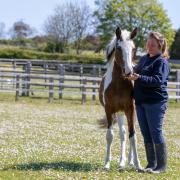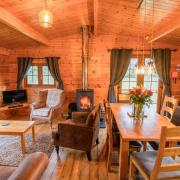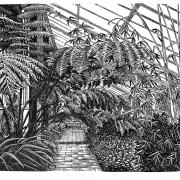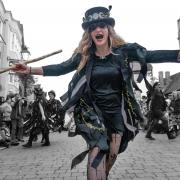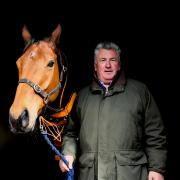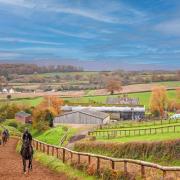Nightjars over the Mendip Hills, little egrets on the Levels, Manx shearwaters off the coast at Burnham-on-Sea - just some of the highlights of living in Somerset for naturalist Stephen Moss, who swapped his London homeland a couple of years ago t...
Diane Scully meets Somerset's self-confessed bird man, Stephen Moss on the Levels
Stephen Moss is a television producer at the world-renowned BBC Natural History Unit where his work includes programmes we're all familiar with and love - 'Big Cat Diary', 'Springwatch' and 'The Nature of Britain'. He's passionate about birds and writes bird books and a monthly column, 'Birdwatch', for 'The Guardian' newspaper.
I met Stephen at his home on the Levels and his enthusiasm for life here is obvious. The move was motivated by the need to be closer to his Bristol work base, but when he set out on his quest to find a new home he wasn't expecting to find somewhere which excited him as much as the Levels. He fell in love with it the first time he set eyes on the watery landscape, not least because he realised the bird life here would be prolific. He's seen more than 150 species within 10 miles of his home.
Stephen's journey to the Natural History Unit came about partly through serendipity. Whilst working for BBC Education he ran into fellow birder Bill Oddie and they quickly found their shared passion for birdwatching was matched by the desire to bring them to our screens. The result of this chance meeting was the series 'Birding with Bill Oddie'. Its success encouraged similar programmes and then a live series, which broke all the rules, called 'Wild in your Garden'. Stephen and Bill were convinced there would be an audience for a programme which simply showed what goes on in your own backyard, and they were right. Its success paved the way for 'Springwatch', which was billed as 'the surprise reality TV hit of 2005'.
When asked about the success of the series, Stephen explains that although he was surprised at the time by how quickly it took off, with hindsight he sees it as having the perfect combination to captivate audiences - familiar wildlife doing unfamiliar things, coupled with the jeopardy of live TV.
"No one knew what was going to happen," explains Stephen. He compares the exhilarating experience of live television with putting on a lavish theatre production. "Imagine," he says, "hiring the best theatre, best technical staff and the best publicity you can possibly find, but you don't know if the actors are going to come, and if they do show up you don't know what they're going to do!" The programme has now seen its fourth series and Stephen has continued to draw audiences' attention to our wildlife with the landmark series 'The Nature of Britain' presented by Alan Titchmarsh.
It's his passion for sharing the pleasure of being in touch with our environment through watching wildlife that drives him. He has always been interested in birds and hasn't lost the enthusiasm he first experienced as a child when he became enchanted by the natural world. Even as a very small boy when taken to feed the ducks he would ask his dumbfounded mother what kind they were.
Stephen fell in love with the Levels the first time he set eyes on the watery landscape, not least because he realised the bird life here would be prolific
Perhaps then it's easy to see why he feels so strongly that many children are missing out on the experiences he took for granted, such as fishing for tiddlers or making dens, and just having the opportunity to go on a voyage of discovery. For Stephen strongly believes that being in touch with and understanding how the natural world works is an important part of children's development and for health and well-being throughout life. He's concerned that children seem to have a better knowledge of dolphins than of dormice, and has set out to interest them in our own native species, believing that ultimately this will lead to an interest in conservation, too.
Keen to pass on his knowledge and love of British wildlife, Stephen is writing a book to appeal to children, which is due out next spring. He's also a volunteer on the RSPB's 'Bird-Friendly Schools Project' where he teaches local schoolchildren.
Being invited to go for a walk with Stephen was not to be missed. Having believed myself to have pretty good powers of observation, I soon found out otherwise as he pointed out a Muntjac deer before we'd even left the garden! The slightest movement was identified before I noticed it was there and, in fact, Stephen talks with one eye constantly roving the landscape! Along the way he told me about some of his Somerset 'firsts'... watching an otter swimming at Shapwick, a recent influx of cattle egrets, and finding the large blue butterfly on Collard Hill, which has been successfully re-introduced to Somerset. We were lucky enough to add another first to his list when we spotted a female hen harrier gliding low over the reed beds, stirring up clouds of white egrets as she flew.
We ended up on Shapwick Heath, one of the most rewarding places in Somerset to watch wildlife. Thousands of starlings fly in to roost here during the winter. Stephen's delighted this spectacle is shared by so many people and it's a memorable experience to stand in the fading light, watching huge flocks silhouetted against a darkening sky before they plummet into the safety of the reedbeds.
Stephen's personal favourite is the swift. "If the key character of birds that makes us want to watch them is flight, then swifts are the ultimate masters. They live in the air and only land to breed. Amazing." In quoting from Ted Hughes' poem 'Swifts', "They've made it again, which means the globe's still working," he encapsulates both the wonder of the natural world and its fragility. BY DIANE SCULLY
Stephen's latest book 'A Sky Full of Starlings', published earlier this year by Aurum Press, priced �12.99), is a thoughtful and funny account of one man's birding year.
What's your favourite bird? Share your favourite Somerset birdwatching spots and swap tips with other readers on the Forum.



